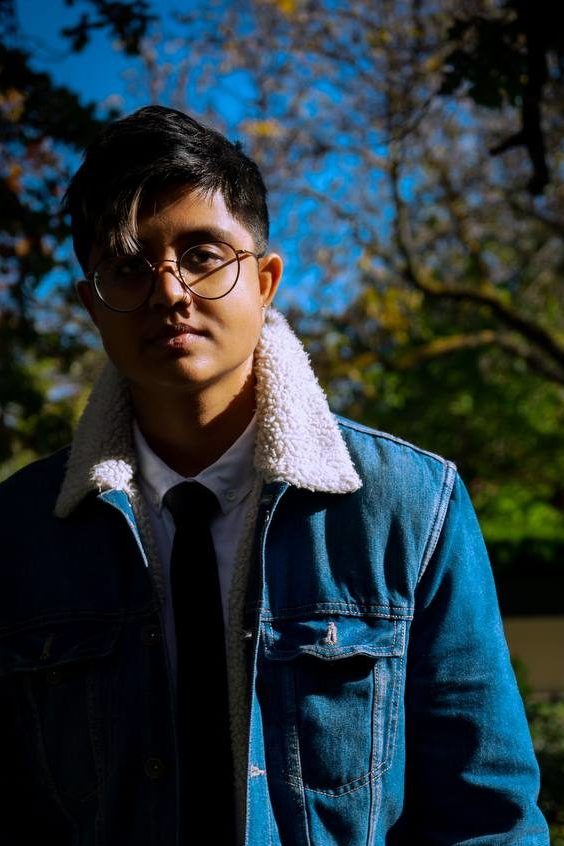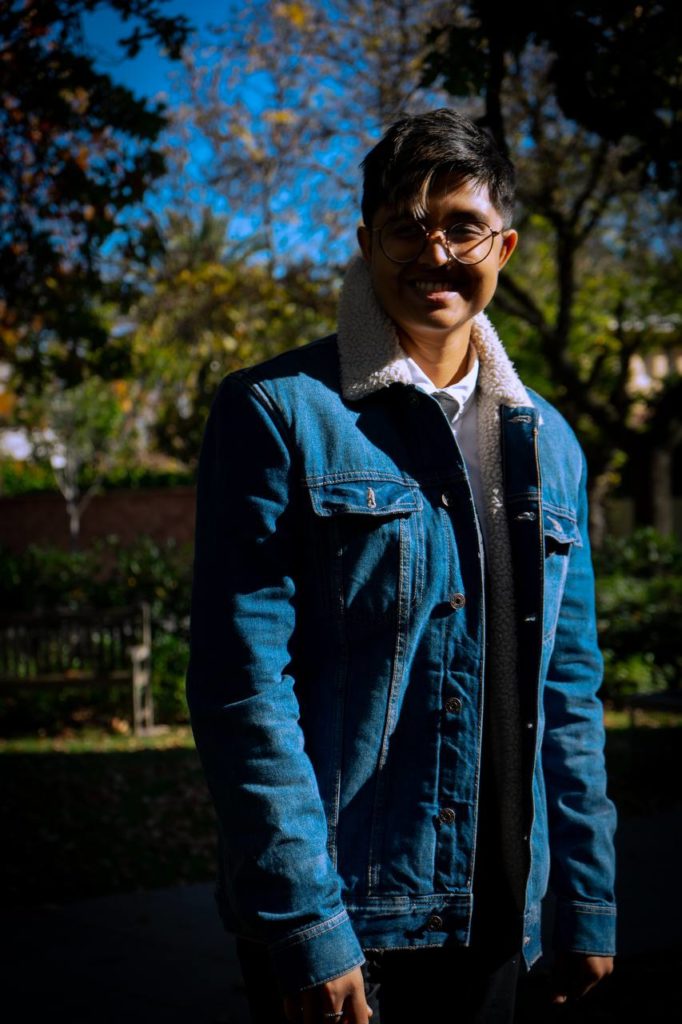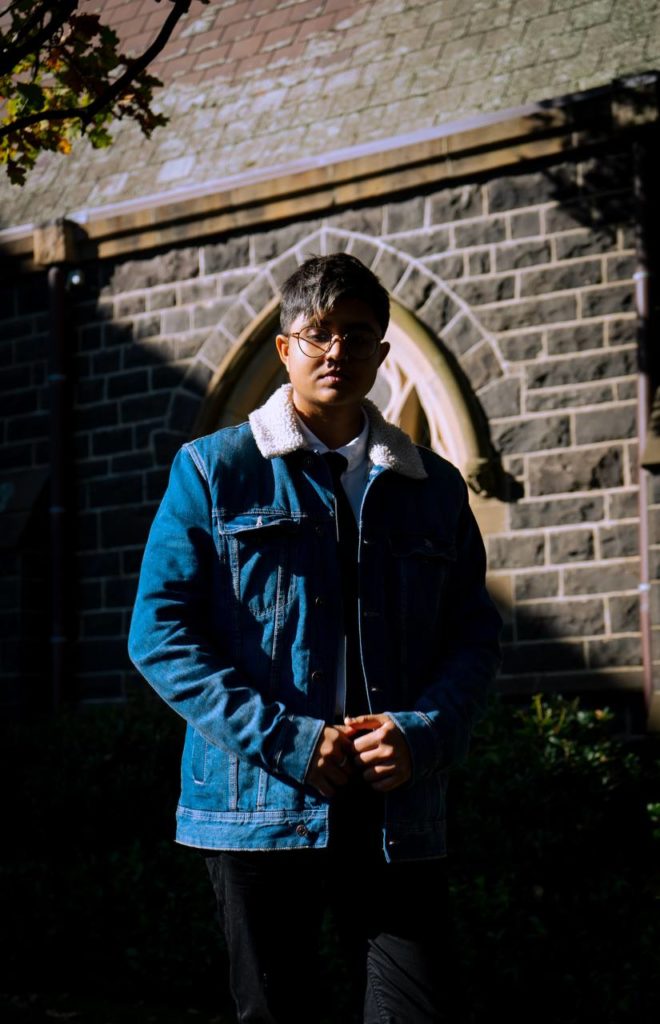Eman, a trans maverick
Mushfiq Mohamed

“I’ve been granted protection!”
Eman
I was ecstatic to get this text message from the other side of the world. Eman Ezekiel had been in Australia for almost two years, hoping to be granted asylum. They had been forced to flee from their native Maldive islands in 2019, their life in danger for failing to meet society’s norms and demands. As someone forced to flee the Maldives around the same time—for broadly the same sin of not conforming—I felt a sense of kinship and deep relief that Eman finally found safety.
Eman was born in 1994. He identifies as trans-masc and non-binary. Trans people have a hard time the world over but the danger to their lives is particularly acute in an ultra-conservative society like the Maldives where anything LGBTQ+ are evils from which the society needs protection and purifying.
When I asked him when he began his transition, Eman said, “I try not to put an emphasis on that – it’s a privilege I once didn’t have and one that my community back home still doesn’t have.” They have been on testosterone for nine months. He spoke in a sobering tone about the changes it has brought to his voice and body “in a way [he has] always felt aligned.”
“I feel like Spiderman who has been bit by a radioactive spider,” he said. “Like when he’s coming to grips with his newfound powers.”
He never fails to make light of the situation.
“Essentially, though, it’s puberty, I’m just a little late to the party,” he summed it up with an impish grin.
When I spoke to him in late January this year, Eman was, as always, animated, and charismatic. He had always been trans-masc, but the timbre of his voice had changed, deepened more, since our previous conversation in May last year. The calmness and ease with which they spoke remained the same, regardless.
Things had not always looked this bright and full of hope. Far from it. Eman’s journey has been a parlous one. They have been ostracised, ridiculed and humiliated nationally before being confronted with the choice of either leaving everything behind and fleeing for their life or facing certain violent death. Many ‘religious warriors’, it was made clear, were waiting in the lines to purify the Maldives of such evils. Estranged from their family, distanced from friends, they had no choice but to try and find a new home and community that would allow them to be.
His accent is Australian with Maldivian undertones. A decade ago, at twenty years old, Eman lived in Australia as a student, but he spent most of his childhood in Malé, the island capital of five square kilometres which sees itself as a major world city. It is one of the most congested places in the world. It is also full of contradictions. Same-sex intimacy is criminalised (for locals) in the Maldives although it lures same-sex couples from other countries through targeted marketing campaigns. Discourses around LGBTQI+ rights are often talked about from the perspectives of tourists visiting the islands, rarely ever in relation to Maldivians who belong to those identities. Tourists and Western expats operate in a parallel legal system that allows exemption from sharia laws. The result of these parallel systems is that non-religious or LGBTQI+ locals, however, are not offered the same protections. There have been reported instances where criminal gangs targeted minorities with violent threats and disappearances. It offers safety and security to some: mostly cis-gendered, observant Muslims, or those with the means to dip in and out of the capital with ease. An island metropolis on paper that sometimes catches political fire, burns and flames into violent mobs.

Eman’s presence is hard to ignore but courting the limelight is not part of their personality. In the Indian Ocean paradise of Maldives, however, the insidious nature of heteropatriarchy and ultra-conservative religious beliefs make their mere existence a spectacle. “I was raised with the expectations of a Muslim woman in a religiously radicalised society that defined gender strictly within the binary. I’m comfortable identifying myself as someone that exists outside of the gender binary, but I don’t entirely reject ‘woman’ from my library of gender definitions for myself. For a while, that was all I had and knew.” They alluded to the hurdles of how they are perceived in a self-consciously conservative society like the Maldives, or even in the West, where many are coming to terms with gender self-identification. The gender vernacular is presented as a new thing we must all poke holes in. The truth is that these identities have long existed and were heavily criminalised in the global south through colonial intervention. When they were growing up, Eman says there was “a clear expectation” for him to fit into “a strictly binary presentation of colonial femininity.” Racial and religious heritage, he says, further complicated these expectations. Little do people know, Eman doesn’t think their gender presentation is entirely a reflection of their sexuality: a fact that will be lost on many accustomed to the man-made binary world we live in.
A harrowing escape from all that is familiar and everything they saw as home hasn’t hardened their gentleness. Just as distance hasn’t mellowed the hardness of their abusers.
In July 2021 Eman uploaded a video on Tiktok. It went viral, and, found its way into the Maldivian social media sphere. Maldivians were not their target audience. In fact, they had taken steps to distance himself from the person who had been hounded out by society and its threats of violence. “I don’t know why it’s happening now”, they say of the new wave of horrendous abuse that have been made to rise against them from the Maldives. “I made a new account. I wasn’t following anyone random. I think they go out of their way to find out about me.”
Eman felt like they had back in 2019 when the initial abuse had begun. The daily barrage of abuse from the public and media both online and offline seemed never-ending three years ago. Local media were cartoonish and sensationalist: “Maldivian woman changes her gender, becomes a man!” read one awkward headline. They had to endure, yet again, the uniquely awful comments sections on online news outlets. One comment read, “Not a man. Not a woman. Not an animal either. You are the devil.” Disturbingly, a verified account of a Maldivian cleric, Dr Mohamed Iyaz, tweeted in response to a news article about Eman’s gender transition to the cleric’s 43,000 followers on Twitter: “Changing the way that Allah created you is highly forbidden.” Out of hundreds of other comments on news sites and social media, many reminded Eman that he would face Allah’s wrath and reminded him of the day of judgement. If it wasn’t clear from the 2019 smear campaign, their expulsion from society was made clear last summer in response to their TikTok video.
It was at a red-carpet event in 2019 that the rug was pulled out from under Eman’s feet. The Olympus theatre was hosting the 2019 Film Festival Awards. Eman was chosen to be on the judging panel at the awards. He dressed for the occasion in a blue suit. Their hair was cut short, dyed silver, and spiked up. Out of all the pictures of the event in the media, it was the picture of Eman that grabbed the limelight, and the imagination, of the public. Their sexuality and gender identity became the subject of a nationwide smear campaign that gripped the entire society. Eman had not been seeking publicity, but the public could not get over its hatred of them. The homophobia that spilt onto Maldivian public space in the form of hatred against Eman during this time is the most hateful and abhorrent I’ve encountered on social media yet. A Maldivian-born person being trans is outside the realm of comprehension for most of Maldivian society. There’s no room for this pageantry in their world.
Many take a victim-blaming stance to say these attacks are justified in a country like the Maldives. The fluidity in Eman’s gender identity offended local cultural and religious sensitivities. “This is the Maldives – people dress a certain way, especially girls”, many say, criticising Eman’s decision to not shrink their non-binary identity. He should’ve played the cards he was dealt. How can one mute a core part of one’s identity simply because it’s deemed offensive by the society one is born into? It’s a question of identity that goes deeper than the clothes one is comfortable wearing. The rapid upward transformation of infrastructure and lifestyle coincided with an increase in religious conservatism that caused a downward transformation in terms of tolerance and personal liberties. There was an accompanying upsurge in violence in the name of religion. Targeted attacks in the name of religion became commonplace and continued with impunity. Numerous Maldivians have fled or gone into hiding in the last decade. Eman, it was said, was not well-adjusted to Maldivian society. Their gender non-conformity was villainized repeatedly. Speaking about the smear campaign that coincided with the pandemic, he said his overwhelming feeling was one of disassociation.
Eman’s dislocation from society happened during a once-in-a-century pandemic. To remain connected to the heritage he had become estranged from, he used the pandemic-driven isolation to cultivate his love of cooking Maldivian food. It helped him cope with life and a world spun into disarray. Social media companies based in Silicon Valley are not helping the security situation for minorities, or those who speak up for them. If people can get away with threatening vulnerable communities in plain English, of course, the algorithm wouldn’t detect any violation of the company’s guidelines when the threats are in a language spoken by around 300,000 people worldwide. These Western companies’ role in fuelling sectarian violence in the global south is well-documented, including the persecution of Rohingya in Myanmar; anti-Muslim mob violence in Sri Lanka and India; and attacks against minorities from violent non-state actors in Muslim-majority countries. It’s an ecosystem muddled with impunity thriving with risks of stochastic terror.

We’re living through a time in which racism, xenophobia, homophobia and transphobia is on the rise everywhere. As a trans man of colour, Eman finds himself at the cusp of all these potential harms. But he has also found solidarity. Had it not been for the LGBTQI+ community in Australia welcoming them, he would not be where he is today. Although the risks to their life were clear, the asylum process took almost two years. “With all the evidence, my case was relatively ‘fast’ in the grand scheme of things – everyone should have equal access to safety regardless of where you come from or how you came here” he rightly lamented.
On top of displacement and transphobia, gender-queer people of colour have to face racial discrimination and micro-aggressions in their new host countries. A continuous process of proving their worth, belonging, and right to life and safety. In some ways, it’s assimilation or death for sexual and religious minorities fleeing Islamic autocracies. No matter how hard it’s been, Eman wants to stay on the course of truth. As bell hooks, one of his favourite authors so eloquently said, “The heart of justice is truth-telling, seeing ourselves and the world the way it is rather than the way we want it to be. More than ever before we, as a society, need to renew a commitment to truth-telling.”
2 comments